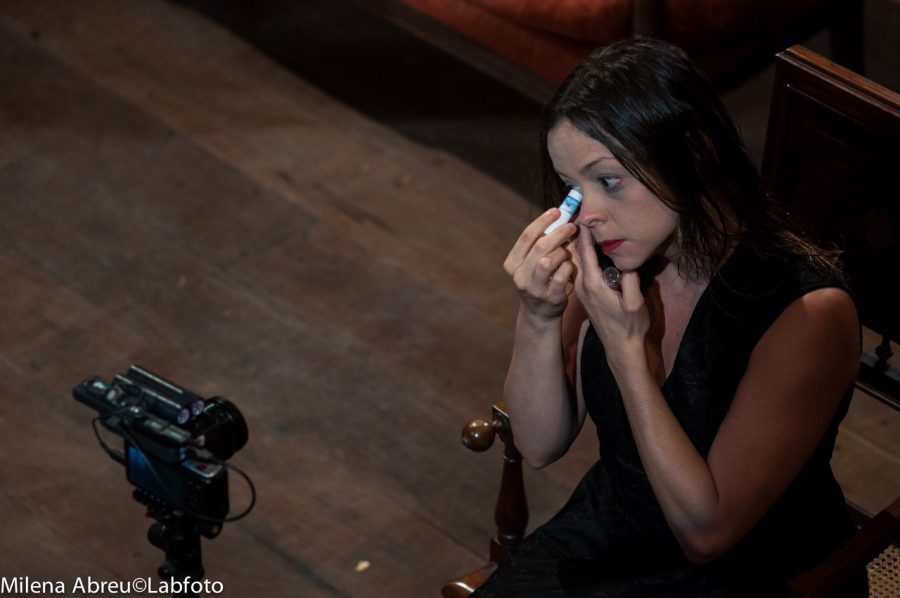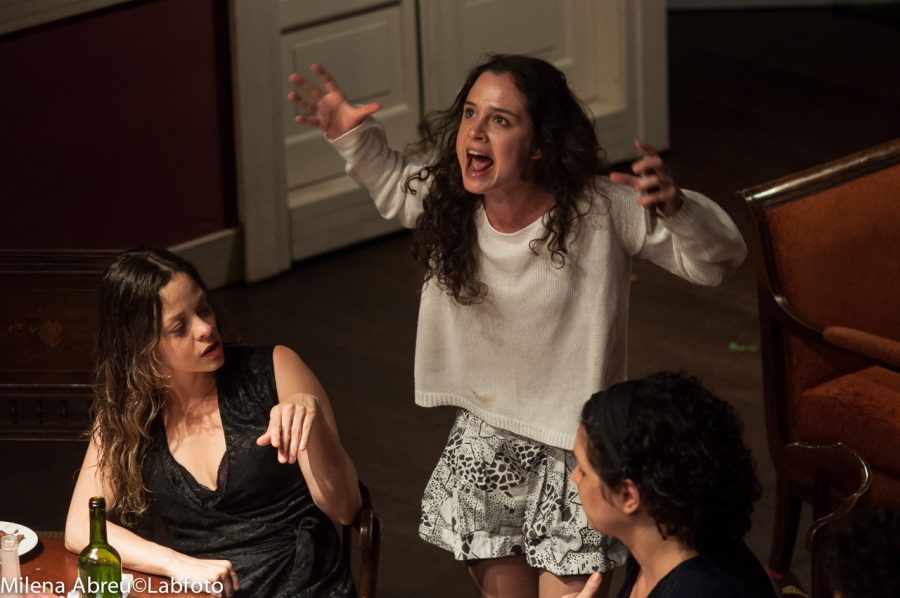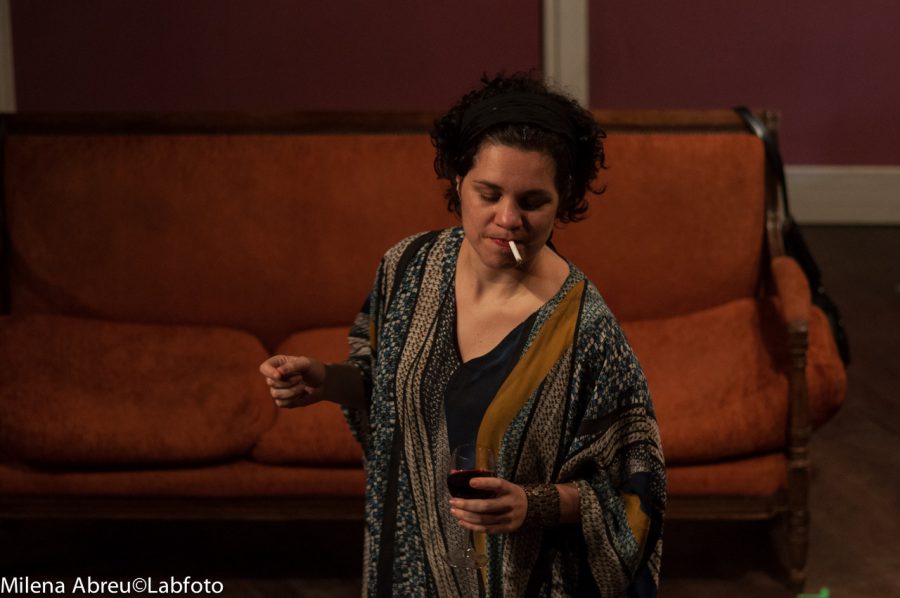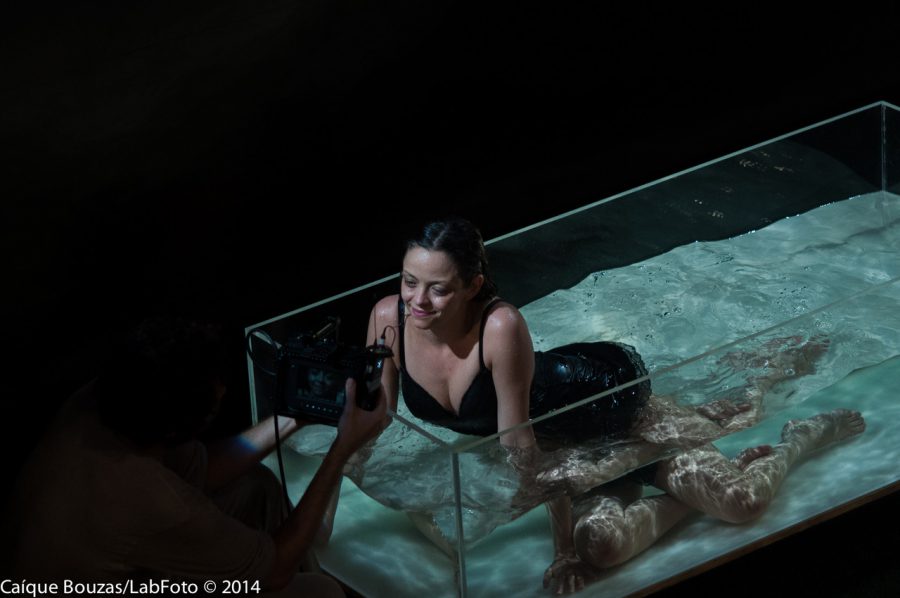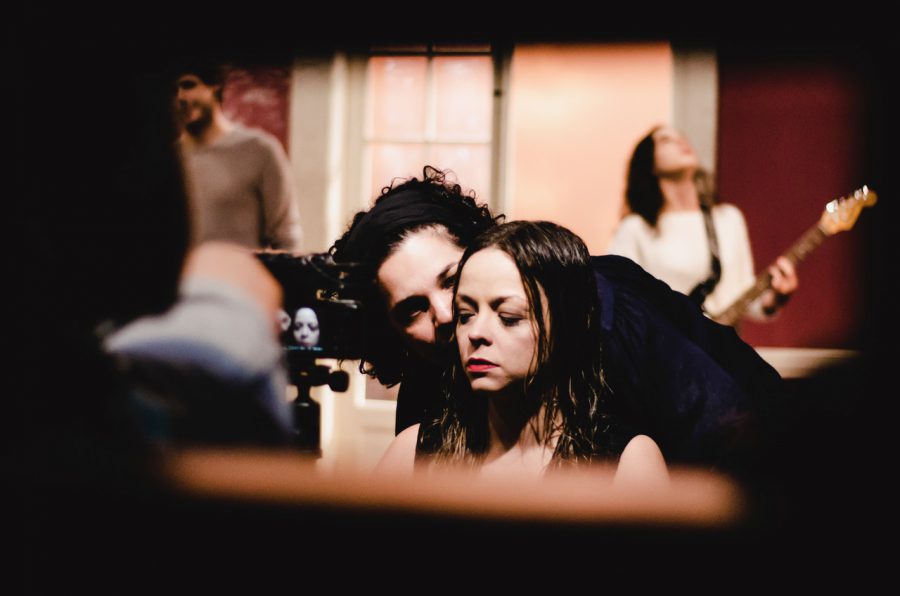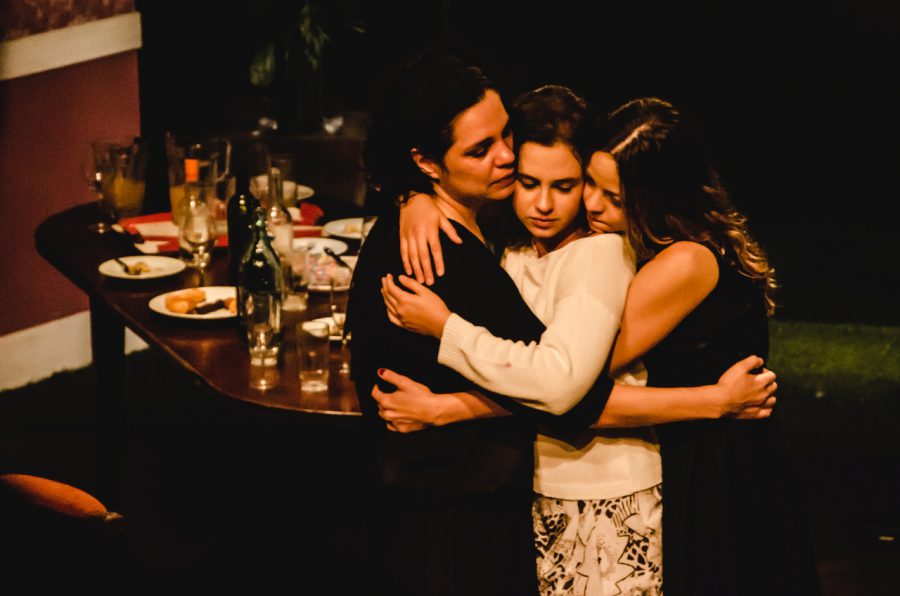What if They Went to Moscow?
2014
What if They Went to Moscow? is the continuity of the research on the relation between theater and cinema on the scene, and of the transposition of the classics to the contemporary reality. The adaptation brings the protagonism of the play to focus on the characters of “The Three Sisters”. The basis of dramaturgy is the text of Anton Tchekhov “The Three Sisters” and the utopia they create about this “other place” called Moscow.
It is the mirror game between theater and cinema. Happening simultaneously in two distinct spaces, the cinematographic images are captured in the theater by three cameras that are integrated to the scene. The film is assembled live and sent to another space, a movie theater, the instant the audio is being mixed. Theater and cinema are happening in the present time, but seen in different spaces and viewpoints.
The challenge is to build two works that exist fully in their territories, but which complement each other when viewed by the same viewer as a unique work. The presence of the cameras needs to be absorbed by the dramaturgy of the scene, since the video projection happen in another environment.
Each camera is related to one of the sisters. Irina, the youngest, has a camera she herself uses, which is more documentary. Olga, the most static, has a camera that is only moved on the tripod and has the function of revealing the house – the architecture of the space and the most open frames – and Macha lovingly relates to her camera. In the theater, Macha’s relationship is with the cameraman, who looks through the viewer, so that in the cinema her look can be directed directly to the camera / lover. In this way, the look of this character, and his desire, is for what it is – for the public, for the cinema. The audience of the theater also has two layers of performance – real and fictional – as the actresses. The viewers are themselves and also the party guests – and sometimes movie extras. The technicians are also integrated into the action, and move the set / stage, the tripods and cables in the theater, being characters from the movie and from Irina’s party. Everything in the theater is apparent and in the service of the scene to realize the film, that has no pre-filmed image.
Premiered at Espaço Sesc Copacabana (Rio de Janeiro, march 2014) and at Sesc Belenzinho (São Paulo, july 2014). Won the awards Shell 2015 for best direction and best actress (Stella Rabello), APTR 2015 Award for best direction, Questão de crítica – best direction 2015, Questão de crítica – best show 2015.
National and international Festivals and Shows: Theatro São Luiz – Alkantara Festival (Lisbon, Portugal), Le CentQuatre (Paris, France), Holland Festival (Amsterdam, Netherlands), Carrefour International Festival of Théâtre (Quebec, Canada), Noordezoon Performing Arts Festival (Groningen, Holland), Alta Temporada (Girona, Spain), Théâtre National Wallonie-Bruxell (Brussels / Belgium), Zurcher Theaterspektakel(Zurich, Switzerland), La Colline (Paris, France), MIT (São Paulo, Brazil), HAU Hebb el am Ufer (Berlin, Germany), Mladi Levi Festival (Ljubljana, Slovenia), Croatian National Theater, Piccolo Arsenale – Venice Biennale (Venice, Italy), Kampnagel (Hamburg, Germany), Cena Contempôranea festival (Brasilia / Brazil), Curitiba Theater Festival (PR / Brazil), Vila Velha Theater – Fiac de Salvador (France), Festival lille3000 (Lill and / or France), Scène Nationale (France), Lille Festival (Lille and France), Théâtre Populaire Romand (La Chaux-de-Fonds / Evreux-Louviers (Louviers / France), Teatre Jarazca – Nowa Klasyka Europy Festiva l (Lodz / Poland), La Comédie (Saint-Étienne / France), Le Parvis Scène Nationale Tarbes-Pyrénées (Tarbes / France), Palamostre Theater (Udine / Italy).
—
WHAT IF THEY WENT TO MOSCOW?
by Christiane Jatahy
Based on the text “The Three Sisters” by Anton Chekhov
Conception, dramaturgy, live edition and direction Christiane Jatahy
With Isabel Teixeira, Julia Bernat and Stella Rabello
Photography direction and Live Camera Paulo Camacho
Scenario Marcelo Lipiani
Costumes Antonio Medeiros and Tatiana Rodrigues
Musical Direction Domenico Lancelotti
Live music Felipe Norkus
Artistic consultant Fernanda Bond
Collaboration on the script Isabel Teixeira, Julia Bernat, Stella Rabello and Paulo Camacho
Video System Julio Parente
Video Operators Felipe Norkus and Bruno Drolshagen
Lighting Operator Leandro Barreto
Stage Manager Thiago Katona
Sound Operators Diogo Magalhães and Benhur Machado
Production Director Rio de Janeiro Tatiana Garcias
Production Coordination and Tour Manager Henrique Mariano
Coproduction: Le CENTQUATRE-Paris (Paris, France), Zurcher Theaterspektakel (Zurich, Switzerland) and SESC (Rio de Janeiro / São Paulo, Brazil).
“What if they went to moscow?” was sponsored by FATE – Fundo de Apoio ao Teatro da Secretaria Municipal de Cultura do Rio de Janeiro and Petrobras
The tour is supported by the CENTQUATRE on the road
Video
Gallery
Press review
How we live in the meantime
"Brazilian director Christiane Jatahy's "Moscow" aptly spins Chekhov's "Sisters"."
Anton Tchekov, une double vie brésilienne à Genève
Christiane Jatahy, haut les “Sœurs”
"Metteure en scène en vue, la Brésilienne présente «What If .. », à Paris. Rencontre avec une femme taraudée par la notion de frontières."
Prêmios e Críticas
Prêmios 2015
Prêmio Shell | Direção – Christiane Jatahy
Prêmio Shell | Atriz – Stella Rabello
Prêmio APTR | Direção Christiane Jatahy
Indicações a Prêmios 2014
Prêmio Shell | Direção, Inovação, Atrizes (Julia Bernat e Stella Rabello), Cenário
Cesgranrio | Espetáculo, Direção, Cenário, Atriz (Isabel Teixeira)
Questão de Critica | Direção, Espetáculo, Atriz (Isabel Teixeira)
Acessar dossiê sobre o trabalho de Christiane Jatahy, na Revista Sala Preta.
Uma das diretoras mais inventivas da cena teatral carioca, Christiane Jatahy tem se dedicado com afinco a conceber obras que borram as fronteiras entre diferentes linguagens artísticas
— Rafael Teixeira, Veja Rio
A complexidade técnica de articular câmeras e cenografia, iluminação e som está visível com a mesma nitidez com que os demais mecanismos se deixam ver, e funcionam com orquestrada precisão. O trio de atrizes – Stella Rabello, Julia Bernat e Isabel Teixeira– imprime um ímpeto físico que explode em força interpretativa.
— Macksen Luiz, O Globo
E se elas fossem para Moscou? sinaliza um inegável avanço de Christiane Jatahy em sua pesquisa e uma notável habilidade para extrair dos atores trabalhos plenamente integrados.
— Daniel Schenker
A performance das atrizes é excepcional cada uma no seu tom, mas formando uma unidade familiar cheia de verdade apesar de suas arestas. Os aplausos finais, com as duas plateias confrontadas nesse entre-espaço mágico, são um cumprimento à inteligência de Christiane Jatahy e um elogio da vida tornada arte
— Carlos Alberto Mattos
E se elas fossem para Moscou? é um montagem fascinante. A analise psicológica das três irmãs é profunda projetada de forma impecável por três formidáveis atrizes. Na adaptação de Jatahy Tcheckov está encapsulado nas atrizes para gerar uma experiência única no teatro e no cinema. Uma extraordinária experiência”
— Juan Carlos Olivares, El Pais, Barcelona
Essa obra vai muito alem de ser uma boa idéia conceitual entre teatro e cinema. Nos desmonstra a beleza absoluta da mutação de um rosto, essa magia instantânea em que uma atriz passa a ser um personagem”
— Jordi Ballo, La vanguardia
“La encore, Christiane Jatahy, n’est pas le seule a vouloir briser la frontiere entre la salle et la scene. Mais elle le fait avec un talent qui trouble, comme una collisión.”
— Brigitte Salino, Le Monde
Dans le fond, et c’est sans doute le but, Christiane Jatahy met chaque spectateur dans une position semblable à celle des trois sœurs : comme chacune d’elle, il rêve d’autre chose, de ce qu’il n’a pas, accessoirement d’un monde meilleur. Il veut aller de l’autre côté, passer le miroir. Il nage entre deux eaux comme chacune des trois sœurs qui, tour à tout au fil de la soirée, se glisse dans un aquarium tenant lieu de baignoire (ou inversement) et flotte entre deux mondes.
— J.P. Thibaudat, Rue 89
“La première (du spectacle) a dévoilé une idée précise de la qualité du travail, notamment la prestation très physique des trois soeurs sud-américaines, Isabel Teixeira, Julia Bernât et Stella Rabello”
— G.R., Liberation, 20/09/2014 (France)
Ce n’est pas la premiere fois que cette talentueuse trentenaire puise dans le répertoire du tournant du XIXe pour exprimer un certain malaise: L’esprit de Tchékhov est là, même si le texte n’est pas respecté a la lettre.”
— Emmanuelle Bouchez, Telerama, 20/09/2014 (France)
“Sans s’embarrasser d’un vieux samovar ni avoir les moyens de s’offrir les services d’une garnison de militaires désoeuvrés, il faut l’optimisme déraisonnable d’une Brésilienne née à Rio de Janeiro pour faire le pari de rendre compte de la plus touchante des manières des Trois Soeurs d’Anton Tchékhov à travers l’organisation d’une simple fête dans un appartement avec piscine.”
— Sourd Patrick, Les Inrockuptibles, 17/09/2014 (France)
“What if they went to Moscow? can only be fully appreciated by seeing the stage version one night and the film version the next. The voids of one version become the volumes of the other. To the discomfort of the cinema audience, the moment when Irina reveals her self-inflicted scars coincides with laughter from the theatre audience, who are reacting to the comedy taking place in the foreground. Even so, as a cinema audience, we are noticeably more placid, as if the camera is spoon-feeding us.”
— Julius Purcell, Financial Times, 14/11/2014 (Spain)
“Una obra que en realidad son dos: en una sala tiene lugar la representación, en la que tres hermanas interactúan con otros actores que, a su vez, son técnicos de vídeo que las graban de cerca y cuyas imágenes la directora edita en directo y se proyectan para el público que hay en una sala adyacente, que ve una obra completamente distinta a través del montaje. Y se lleva unas cuantas sorpresas.”
— Justo Barranco, La Vanguardia, 04/10/2014 (Spain)
“Con What If They Went to Moscow? Jatahy ha dado un paso más en su investigación sobre un lenguaje dramatúrgico donde coexisten y se funden teatro y cine; realidad y ficción; actor y personaje.”
— Imma Fernández, El Periodico de Caralunya, 04/10/2014 (Spain)
